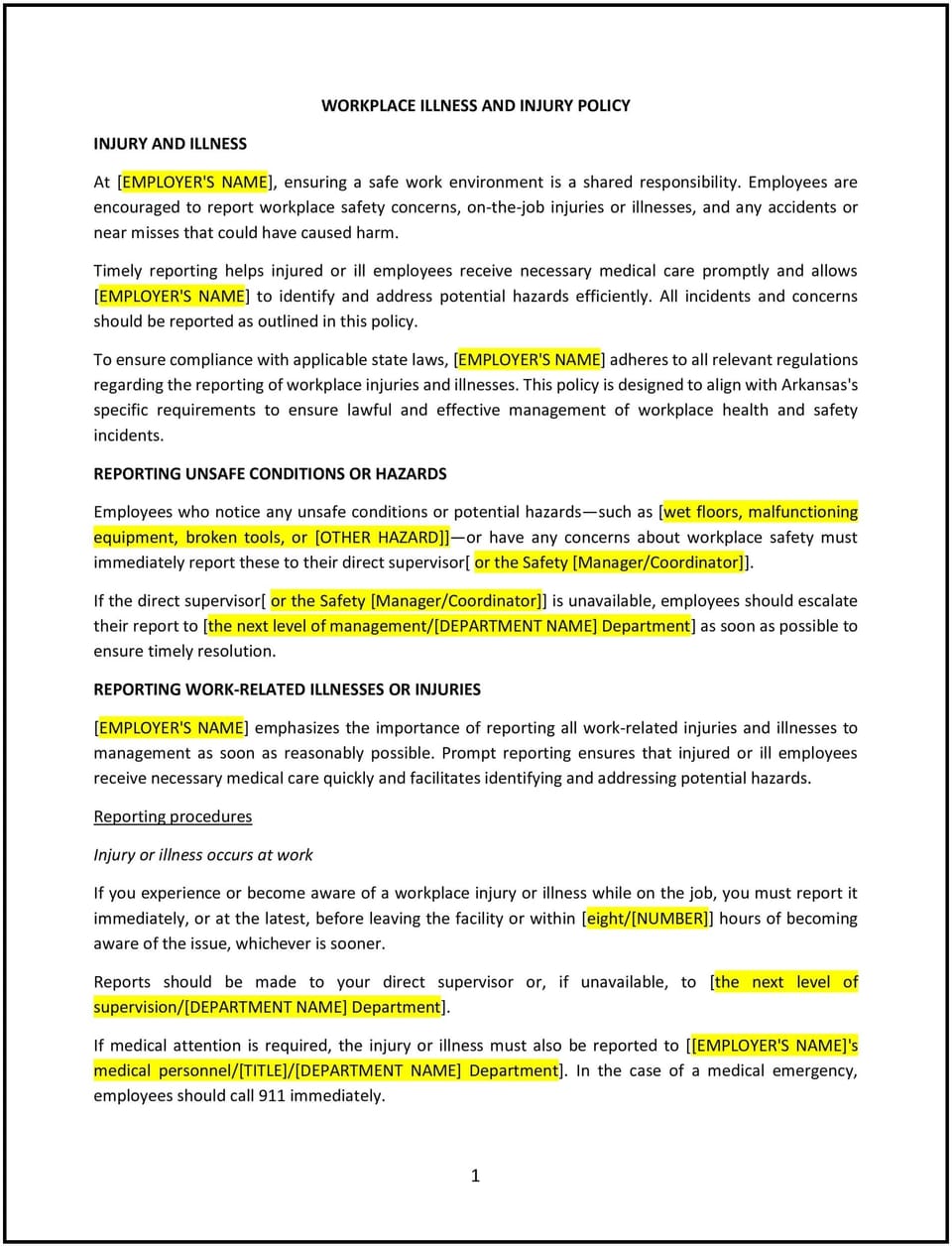Workplace illness and injury policy (Arkansas)

Workplace illness and injury policy (Arkansas)
In Arkansas, a workplace illness and injury policy provides businesses with guidelines to manage and respond to workplace illnesses and injuries. This policy ensures that incidents are handled promptly, employees receive necessary support, and the business complies with state and federal workplace safety regulations.
This policy outlines reporting procedures, investigation protocols, and preventive measures to create a safe and supportive work environment. By implementing this policy, Arkansas businesses can protect employee well-being, minimize risks, and maintain productivity.
How to use this workplace illness and injury policy (Arkansas)
- Define scope: Specify the types of incidents covered, including workplace injuries, illnesses, and near-misses.
- Establish reporting procedures: Provide employees with clear instructions on how to report illnesses or injuries, including timelines and required documentation.
- Outline response protocols: Detail the steps for providing medical assistance, documenting incidents, and investigating causes.
- Communicate prevention measures: Emphasize the importance of workplace safety training, hazard identification, and compliance with safety protocols.
- Maintain records: Ensure accurate documentation of all reported incidents to support accountability and compliance.
Benefits of using this workplace illness and injury policy (Arkansas)
This policy offers several advantages for Arkansas businesses:
- Promotes employee safety: Reduces risks by encouraging prompt reporting and effective management of workplace incidents.
- Supports compliance: Aligns with Arkansas and federal workplace safety regulations, including OSHA requirements.
- Enhances accountability: Establishes clear processes for reporting and addressing illnesses and injuries, ensuring consistency.
- Builds trust: Demonstrates the business’s commitment to employee health and safety, fostering a positive work environment.
- Reduces downtime: Minimizes disruptions by providing a structured approach to managing incidents and preventing recurrence.
Tips for using this workplace illness and injury policy (Arkansas)
- Address Arkansas-specific considerations: Reflect state laws and regulations governing workplace safety and reporting requirements.
- Train employees: Provide regular safety training to help employees recognize and mitigate workplace hazards.
- Use reporting tools: Implement systems or forms to streamline incident reporting and documentation.
- Conduct regular inspections: Identify potential risks and implement corrective actions to prevent workplace incidents.
- Update regularly: Revise the policy to reflect changes in safety regulations, workplace practices, or identified risks.
Q: How does this policy benefit the business?
A: This policy ensures employee safety, supports compliance with Arkansas and federal laws, and provides a structured approach to managing workplace incidents.
Q: What types of incidents are covered under this policy?
A: The policy covers workplace injuries, illnesses, and near-misses, including incidents requiring medical attention or impacting workplace safety.
Q: How does this policy support compliance with Arkansas regulations?
A: The policy incorporates best practices for workplace safety and aligns with state and federal requirements, including OSHA standards.
Q: What steps should employees take to report an illness or injury?
A: Employees should notify their manager or designated contact immediately, providing details of the incident and any supporting documentation.
Q: How can the business prevent workplace illnesses and injuries?
A: The business can conduct safety training, perform regular risk assessments, and enforce compliance with safety protocols to minimize hazards.
This article contains general legal information and does not contain legal advice. Cobrief is not a law firm or a substitute for an attorney or law firm. The law is complex and changes often. For legal advice, please ask a lawyer.


